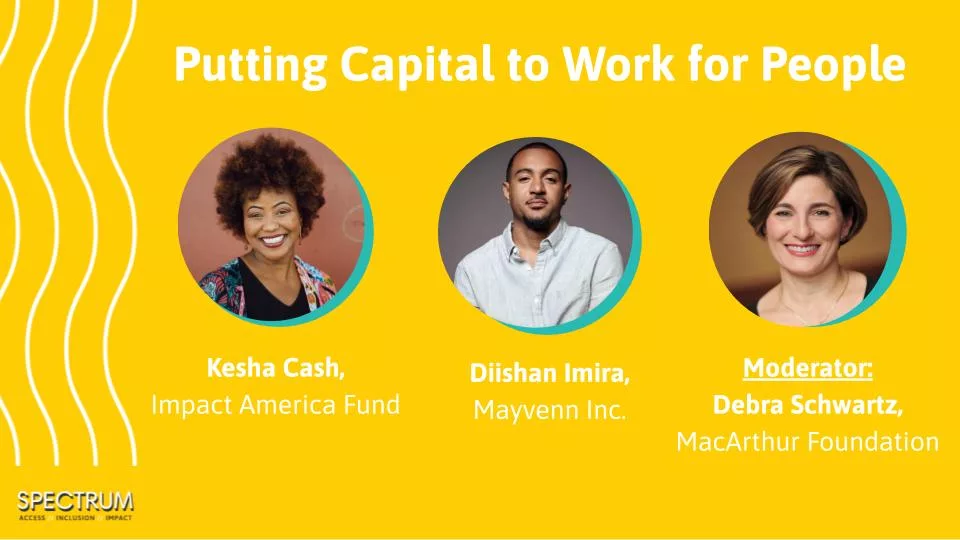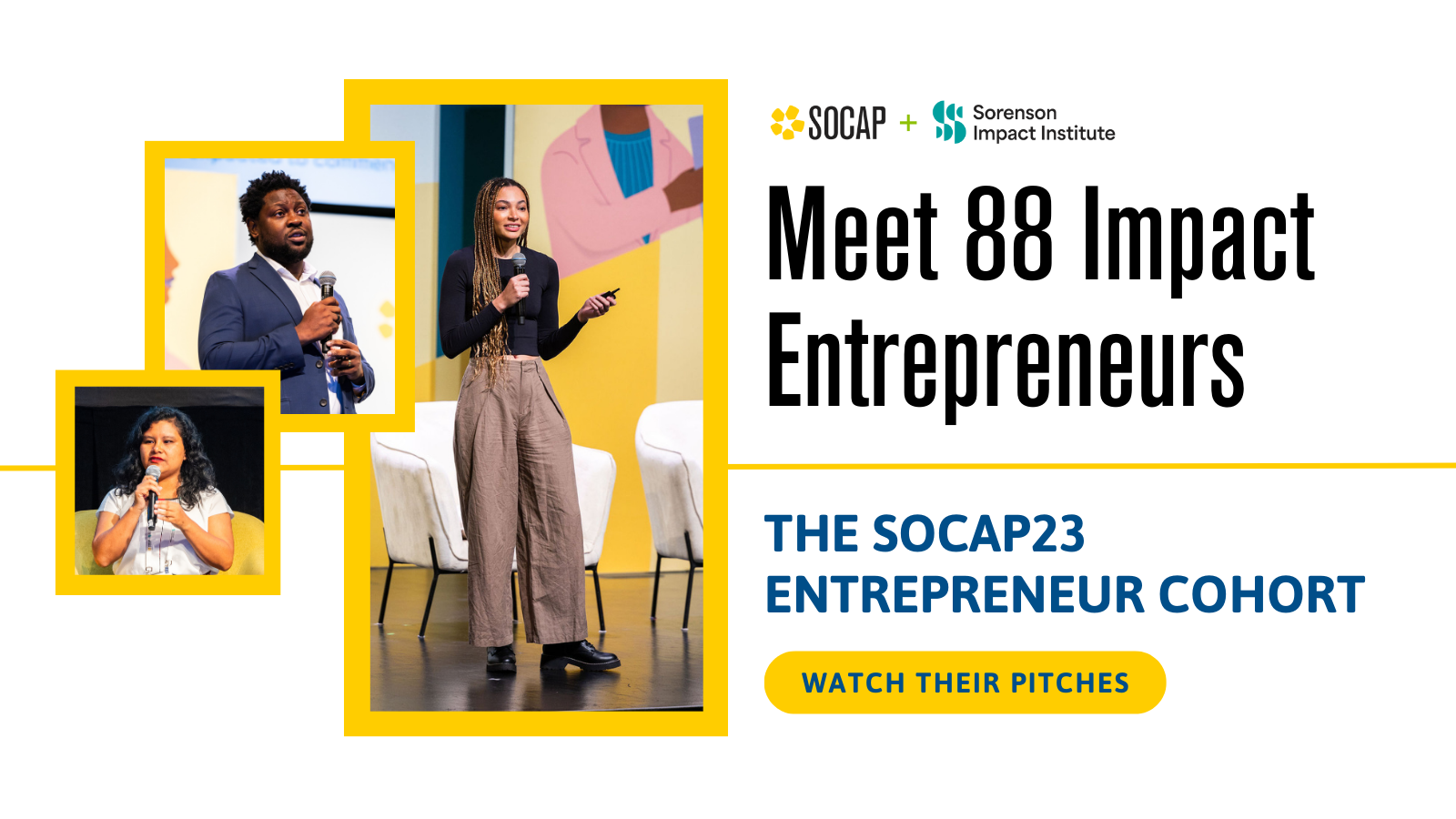Putting Capital to Work for People: Creating Value and Advancing Justice Through Capital Collaborations
When deployed with intention, capital can positively transform the lives of people who have traditionally been exploited by the dominant economic system. In recent years, the impact economy has been allocating money and resources to communities of color in an effort to help rectify systemic inequalities.
“We need capital that aims for justice,” said Debra Schwartz, Managing Director for Impact Investments at the MacArthur Foundation. “It cannot just be aiming for profit alone. That is what impact investing should be about at its core.”
This SPECTRUM session focuses on the ways investors and entrepreneurs can connect to make a positive social impact, highlighting a collaboration between the MacArthur Foundation, the Impact America Fund, and Mayvenn to support Black hairstylists. Representatives from each joined the conversation:
- Diishan Imira, Founder and CEO of Mayvenn
- Kesha Cash, Founder and General Partner of Impact America Fund
- Debra Schwartz, Managing Director for Impact Investments at the MacArthur Foundation
Watch the full session or read the transcript below.
Watch Putting Capital to Work for People, a SPECTRUM20 Virtual Video
Diishan Imira: Good morning. I guess I’m kicking it off and just sort of introducing myself and the company. I’m Diishan Imira, CEO of Mayvenn. We started this company in 2013. The mission of the company is to financially empower African-American hairstylists. I started this business because I had hairstylists in my family, and I noticed that by and large, we were missing out on all of the economic opportunity in the sale of all of the products associated with the hair salon. 95% of Black hair salons don’t retail any products. I wanted to change that. We’ve built a technology platform that empowers stylists to both sell products and earn commissions from them without them having to buy and hold and manage inventory, as well as built a marketplace technology on top of that that also helps customers find our stylists and book them. We’ve generated over $125 million of revenue in the past six years. We have paid out over $25 million in commissions and new bookings for stylists.
Kesha Cash: Great. Thank you, Diishan. Hi, I’m Kesha Cash. Thank you all for attending this virtual conference, and I’m glad that we can continue the momentum during this time. I am the founder and general partner of Impact America Fund and a proud investor in Mayvenn. Impact America Fund focuses on investing in software and tech-driven solutions that are empowering Main Street. What we mean by Main Street are small businesses, consumers, and workers, and we’re very much focused on low and moderate income communities. We sit at this intersection of venture capital, access to capital — my background is from Wall Street — so capital markets and the community. And we’re trying to find new ways of developing systems that would allow us to not only invest in a way that creates financial returns, but also creates social impact for the communities that we care about.
Debra Schwartz: Thanks, Kesha. I’m Debra Schwartz. I’m the managing director for Impact Investments at the MacArthur Foundation. We’re a private charitable foundation, headquartered in Chicago, and I am really pleased and proud and excited to be here with Kesha and Diishan for this conversation. MacArthur’s mission, if you listen to public radio, you might know, is to create a more just, verdant and peaceful world. What that means to us is that we need to reverse the inequalities that exist across society in our world. One of those inequalities is really all about capital. Too often, the capital that’s provided by the conventional banks and investors. Those conventional sources of financing fail to reach or meet the needs of our communities and particularly communities of color, individuals and non-profits as well as entrepreneurs.
We are dedicated to trying to bridge these kinds of capital gaps. We believe that it’s key to creating a more just world, to expanding opportunities, unleashing innovation, and powering all people with the financial resources that they need to thrive. This is what led us to make Impact Investments starting almost 40 years ago. Recently we were fortunate enough to be able to make an investment in Impact America. I think it actually makes MacArthur the largest investor in the new fund. Our investment in Impact America is part of an initiative that we launched last spring. It’s called the Catalytic Capital Consortium, and I invite you to our website to learn more about that. The website is www.macfound.org.
Anyhow, I am incredibly excited about this conversation, and I’m really honored to be able to join both Kesha and Diishan. I think with that, it’s my turn to ask a question. Diishan, say a little bit about how you built Mayvenn differently, perhaps from the traditional mold, and what has that allowed you to do? What opportunities and what risks has that posed?
Diishan Imira: I had a mentor once who told me, he said, “Diishan, you’re not going to make any money until you think really hard about how to make other people money.” That sort of made concrete the idea in my mind that instead of having the mindset of how do I go find places to extract value, how can I be valuable to other people? I think at the end of the day, that is how value creation happens — an intense focus on how you can be valuable to other people. I think a lot of times people have the idea that “I need to go out and extract value from other places,” and “What can I get from other people?” As opposed to really being driven by “How can I deliver value to other people?”
I’ve come into this business with that mindset. Our core audience is hairstylists and our driving KPI in the business is around income per stylist. How are we increasing the income that every one of our stylists can make? Our hypothesis has always been the higher that we can get that number, the better retention we’ll have, the better frequency we’ll have, the more engagement we’ll have from our stylists and our customers. That has proven to be true. I think having a very, very customer centric focus and value contributing focus is a forcing function for more longer term thinking. I think there are times in a company’s trajectory where there’s pressure, whether internal or external, let’s say, to grow. Investors want me to grow. I need to go raise money. I got to grow, especially in the world of technology and Silicon Valley.
A lot of times some of that external pressure or some of that sentiment can cause you to have these decision-making points where I can do something that’s good for the business in the short term, or I can do something that’s good for my customers that will benefit the business in the long term. I’ve chosen to have people around the table with me, including investors like Kesha, that have helped me to stay focused on the customer. In times like that, and in those sorts of decision-making points, to help me stay thinking more long-term about “How do I help the customer? How do we help our stylists increase their income?” That has proven to be fruitful for us in a long-term perspective. We’ve now been in business for six, going on seven years. We’re the leader in our space. I think that has to do with the fact that we have been intently focused on delivering value to our stylists and our customers.
Debra Schwartz: Thank you for sharing that. That’s really a strong story.
Kesha Cash: Really on that note and on that point, Debra, when you think about the work that Diishan is doing and how we get more capital out to founders, like Diishan, that have visions that are impactful visions and business models, can you speak more about catalytic capital landscape? We’re a part of this now. I’m curious as to why catalytic capital on the spectrum of impact investing, what more needs to be done, and how you all are thinking about catalytic capital as it relates to getting from the foundation side to entrepreneurs like Diishan.
Debra Schwartz: Thank you, Kesha. Fantastic. It’s so important to think about that chain and how we’re all linked together, because we’re in the background. We’re the wholesaler, we’re hopefully providing capital in the right forms, the right time and the right ways, but it’s your kind of intermediary really that takes that capital and makes impact happen, because you’re the one that is out there scouting for the entrepreneurs and making the partnerships and helping that capital get ultimately to where it’s needed.
We have been doing this a long time. There has been evolution. The thing that’s remained constant is that we see this need for capital that is patient, flexible and risk tolerant. That’s what we mean by catalytic capital. It’s capital that can be fit for purpose and that is impact driven, or as Diishan was saying, value driven — all about that end beneficiary. How it’s innovated and evolved is that really in our early years, a big focus for us from the beginning was community development financial institutions, or CDFIs, which very few folks had heard of. All of a sudden, they’re kind of having a moment, even though the field has been 30 years in the building and in the making. CDFIs are all about bridging capital gaps. They’re all about building a more just, equitable and inclusive world through purposeful investing and finance.
I really see what you are doing with Impact America and what others are doing with similar kinds of funds. Although, there are none that are really quite as much on point as Impact America. You’re really this next wave that builds and innovates even further. What CDFIs have done is shown the value of this kind of mission-driven finance and Ford Foundation, MacArthur, and others helped build them up starting in the 70s and 80s. They are something that Robert Smith recently called in some television interviews “capillary banking institutions,” which points to their importance because such a huge percentage of African-American neighborhoods in particular don’t have a branch bank, for example. That’s why we know that the federal PPP program, the paycheck protection program, for example, did so badly in reaching Black and brown communities, entrepreneurs and nonprofits. CDFIs have stepped in and they helped bridge that gap. They brought literally billions to those communities, but it is not anywhere near enough.
The work continues. However, as Sharice from Next Street, a long time partner in MacArthur, just pointed out in her session, debt financing is not enough and CDFIs have been and remain primarily focused on debt financing. It’s super, super important, but we know that it’s also the power of equity capital that we need. That is what drew us, of course, to you, and to Impact America and to your teams’ incredible vision for empowering innovative, tech-driven, high impact entrepreneurs like Mayvenn, like Diishan, that are really finding this nexus between mission and money and finding ways to bring all the pieces together. That’s a little bit how we think of the arc if you were to connect the old — and I want to just acknowledge that the old continues to matter too — with the new that continues to innovate and grow and scale, even as new things have come to light.
Innovation is a huge part of catalytic capital. We think it is essential for any kind of deep lasting change in our world. I just want to leave with a shout out to some amazing partners because our foundation really came into this fund in collaboration with, and building on the great work and your great partnerships with so many others, Josh Mailman, the Surdna Foundation, Kellogg Foundation, which has been an amazing leader in this space, and the Ford Foundation, as well as investment platforms like Cambridge and Varus and Trillium. These are the folks that have paved the way, that have been bridging the gap. We’re excited to join in with them and really honored to be at this table. Thank you, Kesha.
That’s how MacArthur got to the table. But really this is so much about what you are doing. And it’d be great to hear you talk a little bit about why did you decide to raise and manage an impact VC Fund and what does that look like when you’re successful?
Kesha Cash: Yeah. I’m going to try to make it a very short answer so we can take questions. Many of you have heard from me at SOCAP in the past. But why Impact VC and not traditional VC? We want to change the way that capital is deployed and what that means for communities of color. Our mission at Impact America Fund is to create economic agency and really empower the community.
For us, on our website, we say, we’re not looking for the next home run. While we’ll certainly embrace a home run and embrace a unicorn, this is much bigger than outsized returns. It’s really outsized impact and outsized transformation for Black and brown communities. Sadly, our communities, large to small businesses and workers and consumers, we’re already — you think about what marginalized means — they’re already on the margins prior to COVID-19. The estimates that 30 or 40% of Black and brown businesses may not recover is scary. What does that mean and what role do we have to play as a fund that has venture capital dollars? We have a ten-year life as a fund. We’re working over the long term to create this change. Our approach is to invest in a technology solution like Mayvenn that’s now empowering your 50,000 hairstyles across the country.
When you peel back the layers on what that means — and these hairstylists are low-income Black women — what does that mean to put extra cash into the pockets of low-income Black women who are hairstylists? Now, we’re thinking, what does that mean in terms of the next generation of hair salons? What does it look like now that we’ve had this hard hit economically in our communities? We’re a small fund with a big vision, playing a very specific role of deploying capital, in a way, back to what Diishan said, that’s not as attractive as it has been traditionally, but we’re really empowering, engaging the community. We think about that across sectors, for daycares, for home care, all of the sectors where Black and brown people have large numbers of jobs. How do we secure those sectors and then enhance those sectors and provide additional opportunities within those sectors?
Cari Hanson: Great. Thank you, Kesha. I am really loving this conversation and all of the various pieces of it and kind of going, Kesha, to your comment just now, Diishan, I am just kind of thinking about what’s next, in particular with where we are right now. Diishan, We had a question from the audience asking, have you considered becoming a worker-owned business to give workers greater power and perhaps the ability to generate more wealth?
Diishan Imira: I have considered that. In fact, Kesha Cash and I, we have a standing meeting to discuss this exact issue. There’s a lot of, I think, opportunity. There’s a lot of technology and different ways to structure, cap tables, and a lot of sort of novel ideas out there about how to do this. We’ve thought through ideas such as having an equity pool that stylists can take part in. Then you have to think through how do you dole out that equity and what metrics do you use to distribute it, and how you measure it over time, et cetera, et cetera. There’s also discussions around using crypto and using blockchain technologies to create coins or something else, another asset of value that can be distributed through the community. The devil is in the details, but this is something that we’re looking at, and we’re certainly committed to figuring out and understanding how to do it. I think it can be very powerful, and I think it will become very powerful in the future.
Kesha Cash: What I want to add to that per our most recent investment in Mayvenn, Diishan agreed to an aside letter that he would actively lean into, learn about and work on this, what we called an equity stylist plan, for a working name. That research had started taking place before COVID. When COVID hit, priority was to just get some cash in the hands of hairstylists. Within a matter of weeks, Diishan and Mayvenn raised one and a half, close to one and a half million dollars, maybe $1.7 million, to deploy to the hairstylists. This work was taking place, and I say that to say that it’s a phased process. When you think about impact, the impact that a startup may have on day one looks very different when you’re a seven-year-old company like Diishan’s is. You have a healthy balance sheet, and you have revenue when you have 50 employees, and you have a board. You’re able to get more creative in terms of those structures. We’re really excited about continuing that discussion.
Cari Hanson: Thank you, Kesha. That’s an excellent next piece for us to consider. I think one of the things I wanted to ask really quickly kind of just coming along with that is, are there other strategies being deployed to ensure that Black and brown businesses are able to stay around? We’ve got to wrap our arms around businesses right now. Can you share some of these other strategies?
Debra Schwartz: I might start and then Kesha could add in. I think I mentioned PPP, and I think it’s important to know there still is money left in that federal program. Those are forgivable grants. It’s not an easy program, but if you have a relationship with a bank or with a CDFI in your community, a Community Reinvestment Fund nationally has been doing a lot of this work. That is a source that’s a more sort of immediate emergency source. It’s not going to cover expenses for months and months, but it’s out there. There are funds that have been set up in Chicago, New York state and elsewhere in the country that are providing, in some cases, grants to small businesses, prioritizing again, communities of color that are being hard hit by the pandemic, hard hit by the economic downturn, and hard hit by that history of not having adequate access to capital. There is the Small Business Resiliency Fund in Chicago. New York state announced their fund about 10 days ago. I think that’s another trend that we’re seeing.
Again, no one thing is going to be the solution and we definitely need the grant money that is coming from the public sector to be part of the work that gets done.
Kesha Cash: Yeah. I don’t have much to add there. I just kind of go back to what we’re seeing in our own portfolio and the innovation of our portfolio companies. We’re very much focused on software and tech because you can do things at scale. We’re investors in a company, CareAcademy, that provides education, online training for direct care workers. 60% of direct care workers in America are low income women of color. What does it look like to ensure that not only are they properly trained for their direct work, but how do we then create economic mobility and opportunities for those care workers to have more of an integration with the healthcare system? It just becomes really interesting when you find entry points to large market opportunities, home care and direct care and home health care is a very large market opportunity.
Many folks are investing in this space, but they’re not doing so with the home care worker, direct worker in mind. Regardless, we need many approaches strategies, but those strategies have to be focused on the key stakeholder and recognize the value of that stakeholder. Mayvenn is built around the value of the hairstylist. CareAcademy is being built around the value of the direct care worker. I hope that we keep that in mind as we go forward because then we’re going to see new, innovative models that we haven’t seen before.
Cari Hanson: Absolutely. We have a few more minutes to this conversation and as we move to wrapping up. I’m curious if you can wrap us up with kind of a final thought around your work in this area. Then as we’re thinking about inclusion for today, a final thought that you can leave us for this session.
Kesha Cash: My final thought is collaboration. These are unlikely suspects to have together, and we’re working together. This is not a show. This is real work behind the scenes. MacArthur has visited Diishan’s office, and MacArthur and I are in partnership, and Diishan and I are in a partnership. It requires a collaboration of good people that are mission aligned to get this work done. I am thankful for MacArthur and all of our partners in this in order to empower Diishan to do what he needs to do on the ground in community.
Debra Schwartz: I would certainly echo Kesha on collaboration. As she said, we are so mindful of our fantastic partners with whom we’re partnering in the investment in Impact America and in many other ways. My parting thought is that when we think about justice, and we think about trying to create a world that is more just — and that is, fortunately, on people’s minds in a way now that we’re seeing that we’ve never seen before — when we think about that, we need to remember while it is only a piece, capital is part of the story.
We need capital that aims for justice. It cannot just be aiming for profit alone. That is what impact investing should be about at its core. That is what catalytic capital, for sure, is about at its core. I believe that is what Impact America and Mayvenn are about — using capital to build a more just world. That would be my parting thought.
Diishan Imira: Thank you. I think I would just say that impact and generating profits and returns are not mutually exclusive things. That, in fact, if we boil it down to what makes companies great and what makes companies sustainable and last in the long run and grow, it’s that you’re able to deliver really, really impactful value to an end customer. Some of the most impact that you could make are in ways that can actually change people’s lives. I think that there’s a tremendous amount of untapped potential in terms of returns in companies whose aim and mission is to really change and improve people’s lives. There’s a tremendous amount of untapped value there, and returns will come with that.







